Film Name:動物世界 / Animal World
I hadn’t planned on seeing this film at first, but as its release date approached, I encountered more and more positive reviews. Learning it was a comic adaptation directed by Han Yan finally piqued my interest… To truly judge a film’s quality, the best approach is to watch it yourself—that way, whatever you say carries weight.
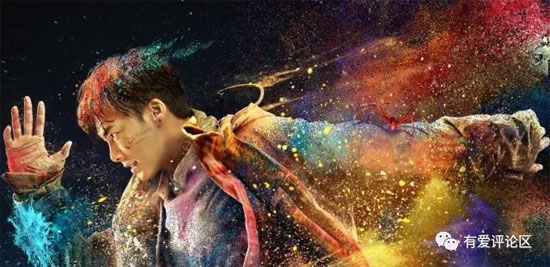
“Animal World” delivers exactly the kind of satisfying spectacle you’d expect. For me, though, that satisfaction extends beyond its main draws—the mind-bending game mechanics and wild imagination—to countless subtle details in the background. It’s these little touches that give the film its rich, satisfying flavor without ever feeling cloying.
[Friendly reminder: Spoilers ahead.]
This marks director Han Yan’s third feature film. His previous work, “Go Away Mr. Tumor,” remains memorable to many viewers. That romantic comedy, infused with heartwarming and touching elements, managed to stand out amidst a sea of formulaic chick flicks. To a significant extent, this was due to the inclusion of numerous whimsical scenes featuring the female lead Xiong Dun, lending the film a lively and playful charm.
In adapting the Japanese manga “Ultimate Survivor” into “Animal World,” Han Yan not only continues this signature style but also fully unleashes his creativity through this dark-themed work, breaking free from previous constraints.
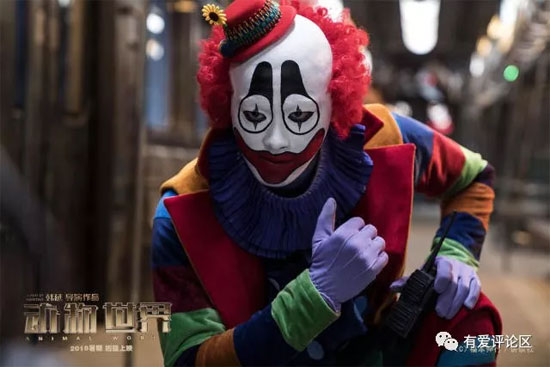
The embodiment of all this is Zheng Kaishi’s imaginative alter ego, “The Joker.”
A city street race where pulling one hair sets off a chain reaction, battling demons beneath the moonlit sea and sky, striking down and slaying the ever-present human-skinned beasts… Though seemingly an absurd, tangential subplot, the Joker’s arc profoundly enriches the film’s dark, grotesque, yet kaleidoscopically chaotic texture, infusing this largely realistic work with a refreshing dose of fantasy.
Beyond this quality, Animal World boasts an even more significant strength: its meticulous attention to detail.

We’ve seen plenty of “feel-good flicks,” but those with coherent logic and relatable appeal are far fewer. Many blockbusters (especially domestic ones) often leave audiences feeling “something’s missing”—and judging by this film’s premise alone, it seems prone to that pitfall.
Yet “Animal World” possesses this patience, dedicating substantial screen time before the main plot unfolds to refine character development and narrative flow. I admit Zheng Kaisu’s personal history, his awkward relationship with Liu Qing, and his betrayal by childhood friend Li Jun felt tedious—perhaps a third of this exposition could have been trimmed… But it’s precisely this meticulous groundwork that allows subsequent character transformations and plot twists to feel seamless.
By the time Zheng Kaishi, cornered and desperate, boards the “Fate” ship to gamble his life away, the audience’s acceptance of this fantastical gambling scenario has subtly grown.
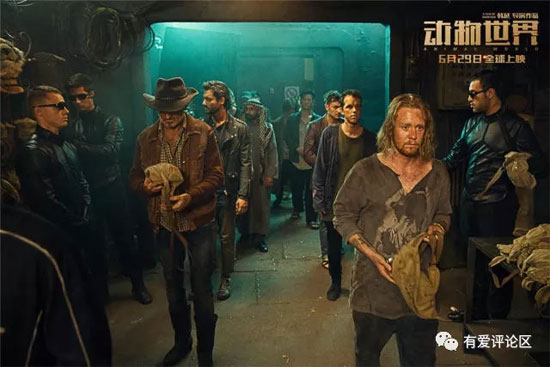
The film even resolves the recurring joke-like plot hole where “everyone in the world speaks/understands English/Chinese” by introducing simultaneous translation earpieces. This shows just how meticulous the production team was—or rather, how many others before them had been careless and sloppy…
The climax of “Animal World” unfolds as a high-stakes game aboard a cruise ship on the high seas. Most participants are debt-ridden “Losers” fighting for their lives, while others are worldly, insatiable gamblers. The game is simple: rock-paper-scissors, familiar to everyone.
This high-stakes game, determining the fate of all participants, is merely a pastime for the privileged few watching and betting from behind the scenes…
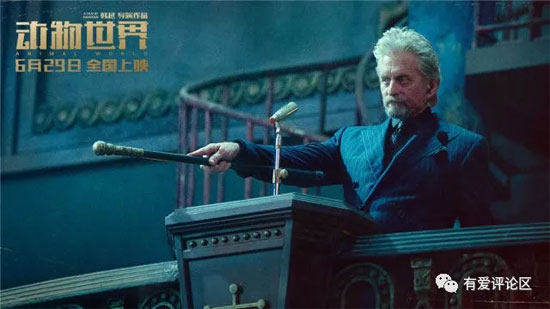
Their representative, Anderson, stood like a tiger surveying all competitors—a symbol of this “animal world’s” ruler, the undisputed king at the apex of the food chain whose authority brooked no defiance.
Each player starts with three stars and twelve cards—four each of rock, paper, and scissors. They face off at the table: the winner takes the loser’s stars, while ties result in discarded cards. Victory comes to whoever retains at least three stars and depletes their hand within the time limit. Beyond the prohibition against secretly discarding cards, this gamble has no rules.
The simpler the game, the more brutal and bloody it becomes. Human nature and animal instincts are all too easily “exposed” in such high-stakes environments—by the end of the match, the losers forfeit their very bodies, while victors with surplus stars can cash them in for vast sums of money.

The casino is an arena where lions and tigers reign supreme, dictating the rules of combat: lending, trading, and of course, deceit and betrayal… The king of beasts strips away so-called morality and boundaries, exposing the primal instincts lurking within every heart. It restores an “Animal World” devoid of loyalty or shame, where only survival and profit matter. Only then can the “beastly combat” become a bloodbath where every strike is lethal.
The supporting characters in “Animal World” shine brilliantly, showcasing the diverse facets of humanity when stripped bare by the law of the jungle.
Zhang Jingkun is the quintessential fox—smooth-talking and cunning. Spotting a “newbie,” he immediately greets him warmly as a fellow countryman: “Bro, I’ve seen the world. You’re young, don’t get mixed up in this mess. Listen to me, and you won’t go wrong…”
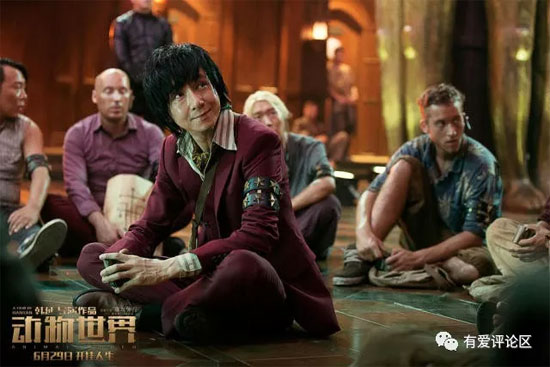
After lecturing Zheng Kaishi, he immediately turns on him, bares his teeth in a menacing grin, and moves on to scout new prey… But greed proves his undoing. In the final stretch, he insists on collecting one last round of “stupidity tax.” When confronted with a tough nut to crack, his cleverness backfires spectacularly, forcing him to spit out everything he’d swallowed.
As for Zheng Kaisi, Li Jun, and Meng Xiaopang—initially seen as a clueless lamb, a listless chicken, and a slippery pig, mere livestock awaiting slaughter in others’ eyes—until Zheng Kaisi, having learned his lesson the hard way, bared his fangs.
Within the game’s time limit, Zheng Kaishi cloaked all three in wolf skins, staging a rather bumpy performance of “Lone wolves die, packs survive.” This seemed like a rather educational and inspiring story.

But the cunning of “Animal World” lies precisely beneath the surface—unconditional trust is too extravagant in the dark jungle. After fulfilling his duty as the alpha wolf, Zheng Kaishi faces enormous profits within reach. The harmless, dumb pigs instantly transform into treacherous rats, and the dejected chickens, after a few cries, become scavenging vultures.
So-called humanity crumbles before the naked brutality of animal instinct.
What’s commendable is that the film avoids simplistic moralizing from a high horse. As Wei De said in The Three-Body Problem: “Lose your humanity, and you lose much; lose your animal instincts, and you lose everything.”

In truth, Zheng Kaishi ultimately relies on his own “animal instincts” to turn the tables— Without the eagle’s sharpness, he couldn’t have stolen the value from Scarface in the dark room; Without the leopard’s decisiveness, he couldn’t instantly reclaim what was rightfully his; without the bear’s brute courage, he couldn’t unleash his fury in that chaotic environment…
The film’s animal metaphor for Zheng Kaishi seems to be the gorilla… While bearing animalistic traits, he never forgets to yearn for and embrace humanity.
“The battles I should fight, I’ve fought. The paths I should walk, I’ve walked to their end! But the path I believe in, I’ll guard it myself!” This somewhat adolescent line truly serves as Zheng Kaishi’s best motto.

Thus, in this place saturated with lies, Zheng Kaishi stubbornly redeems the “stranger father” he met by chance with three stars—not questioning truth or falsehood, but seeking only to act without regret.
Of course, “Animal World” has its flaws too. For instance, Li Yifeng—whose acting progress has been widely praised—still has considerable room for improvement (though that could be seen as a strength from another angle). The “mind-bending” parts during the game feel somewhat formulaic, the protagonist’s comeback leans too passive and lacks explosive impact, and the transition between reality and fantasy feels overly abrupt… Yet, when faced with a domestic commercial film this well-rounded, criticism tends to slip by unnoticed.
See you in the sequel.
Please specify:Anime Phone Cases » Animal World 動物世界 2018 Film Review: Losing one’s animal instincts, losing everything